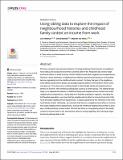Files in this item
Using sibling data to explore the impact of neighbourhood histories and childhood family context on income from work
Item metadata
| dc.contributor.author | Hedman, Lina | |
| dc.contributor.author | Manley, David | |
| dc.contributor.author | van Ham, Maarten | |
| dc.date.accessioned | 2019-05-31T11:30:01Z | |
| dc.date.available | 2019-05-31T11:30:01Z | |
| dc.date.issued | 2019-05-30 | |
| dc.identifier | 259034333 | |
| dc.identifier | 70cf28f3-b8cb-4878-84dd-98d06821b43a | |
| dc.identifier | 85066481773 | |
| dc.identifier | 000469425500029 | |
| dc.identifier.citation | Hedman , L , Manley , D & van Ham , M 2019 , ' Using sibling data to explore the impact of neighbourhood histories and childhood family context on income from work ' , PLoS ONE , vol. 14 , no. 5 , e0217635 . https://doi.org/10.1371/journal.pone.0217635 | en |
| dc.identifier.issn | 1932-6203 | |
| dc.identifier.other | ORCID: /0000-0002-2106-0702/work/64697476 | |
| dc.identifier.uri | https://hdl.handle.net/10023/17787 | |
| dc.description | The research leading to these results has received funding from the European Research Council under the European Union's Seventh Framework Programme (FP/2007-2013) / ERC Grant Agreement n. 615159 (ERC Consolidator Grant DEPRIVEDHOODS, Socio-spatial inequality, deprived neighbourhoods, and neighbourhood effects). | en |
| dc.description.abstract | Previous research has reported evidence of intergenerational transmissions of neighbourhood status and social and economic outcomes later in life. Research also shows neighbourhood effects on adult incomes of both childhood and adult neighbourhood experiences. However, these estimates of neighbourhood effects may be biased because confounding factors originating from the childhood family context. It is likely that part of the neighbourhood effects observed for adults, are actually lingering effects of the family in which someone grew up. This study uses a sibling design to disentangle family and neighbourhood effects on income, with contextual sibling pairs used as a control group. The sibling design helps us to separate the effects of childhood family and neighbourhood context from adult neighbourhood experiences. Using data from Swedish population registers, including the full Swedish population, we show that the neighbourhood effect on income from both childhood and adult neighbourhood experiences, is biased upwards by the influence of the childhood family context. Ultimately, we conclude that there is a neighbourhood effect on income from adult neighbourhood experiences, but that the childhood neighbourhood effect is actually a childhood family context effect. We find that there is a long lasting effect of the family context on income later in life, and that this effect is strong regardless the individual neighbourhood pathway later in life. | |
| dc.format.extent | 21 | |
| dc.format.extent | 624974 | |
| dc.language.iso | eng | |
| dc.relation.ispartof | PLoS ONE | en |
| dc.subject | GF Human ecology. Anthropogeography | en |
| dc.subject | HT Communities. Classes. Races | en |
| dc.subject | HQ The family. Marriage. Woman | en |
| dc.subject | E-DAS | en |
| dc.subject.lcc | GF | en |
| dc.subject.lcc | HT | en |
| dc.subject.lcc | HQ | en |
| dc.title | Using sibling data to explore the impact of neighbourhood histories and childhood family context on income from work | en |
| dc.type | Journal article | en |
| dc.contributor.sponsor | European Research Council | en |
| dc.contributor.institution | University of St Andrews. School of Geography & Sustainable Development | en |
| dc.identifier.doi | 10.1371/journal.pone.0217635 | |
| dc.description.status | Peer reviewed | en |
| dc.identifier.grantnumber | ERC-2013-CoG | en |
This item appears in the following Collection(s)
Items in the St Andrews Research Repository are protected by copyright, with all rights reserved, unless otherwise indicated.

